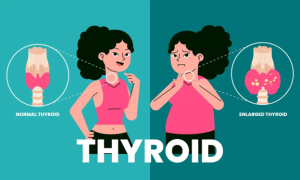Introduction
Whenever you are hot or cold, have you ever wondered how the temperature of your body is being regulated? A special butterfly-shaped gland called the thyroid gland is the internal regulator, situated at the base of your neck.

Source:Kampus/GettyImages
The gland is found just below your Adam’s apple, it is essential to the health of your body. It serves as your body’s internal thermostat by generating hormones that affect various bodily processes.
Although the thyroid gland is primarily known for temperature regulation, it secretes hormones involved in several other bodily functions. In this article, we want to educate Africans on thyroid gland functions, common disease conditions, and how to maintain healthy thyroid health.
The Internal Lords of Metabolism: Thyroid Hormones
The thyroid gland produces hormones essential for metabolism and bodily functions. The two primary hormones are thyroxine (T4) and triiodothyronine (T3). In the gland thyroxine (T4) is present, however, T4 is transformed in human tissues to triiodothyronine (T3), which is the active form. These hormones control metabolism, or how quickly the body turns food into energy, acting as a control authority.
We discuss their functions and how they affect general health.
- Growth and Development: In children, thyroid hormones are essential for healthy growth and development, while in adults the hormones are crucial for healing and development. Thyroid hormones have a direct effect on weight gain, loss, and obesity, in health it is well regulated, however, excess thyroid hormones cause unwanted weight gain and obesity. In contrast, low thyroid hormone causes weight loss.
- Blood Pressure and Heart Rate: The thyroid hormones affect blood pressure and heart rate. In sickness, excess thyroid hormone can cause the heart to beat faster leading to heart failure.
- Temperature Regulation: Thyroid hormones assist in controlling the body’s temperature keeping you warm or cool as necessary.
- Brain Function: Memory, emotion, and cognitive performance are all influenced by thyroid hormones.
- Digestive System: Thyroid hormones support healthy nutrition, absorption, and digestion.
- Muscle function, strength, and healing: Thyroid hormones play a role in controlling the strength and function of muscles. Protein synthesis is regulated by thyroid hormones essential for tissue growth and repair.
Common Thyroid Conditions

Source: Fitpaa
Thyroid diseases fall into these two primary categories; Overactive thyroid/hyperthyroidism and underactive thyroid/hypothyroidism. Other include autoimmune diseases(causing goitre), thyroid nodules, and thyroid cancer.
● Hyperthyroidism:
The thyroid overproduces thyroid hormone in this disease. Common causes include- the autoimmune condition Graves’ disease, thyroiditis, toxic adenomas, and high iodine consumption.
This may result in symptoms such as:
- Unexpected weight loss,
- elevated cardiac rhythm and palpitations,
- agitation and uneasiness,
- inability to fall asleep,
- severe sweating,
- tremors,
- regular bowel motions, and
- increased appetite.
● Hypothyroidism:
When the thyroid gland doesn’t produce adequate thyroid hormone, the condition is known as hypothyroidism (underactive thyroid). Common causes include radiation therapy, certain medications, iodine deficiency, and the autoimmune disease Hashimoto’s thyroiditis. Symptoms include:
- Unexpected weight gain and inability to lose weight,
- slow heart rate
- fatigue,
- cold intolerance,
- dry hair and skin,
- weakened muscles,
- depression, and
- irregular cycles of menstruation
● Thyroid Nodules:
Thyroid nodules are lumps or abnormal growths within the thyroid gland. It is mostly benign, although some can be cancerous or cause hyperthyroidism. It is often asymptomatic (showing no symptoms).
In some cases, symptoms include:
- larger nodules may cause a visible lump,
- difficulty swallowing, and
- breathing problems.
● Goitre:
Goitre is simply an enlargement of the thyroid gland. Common causes are iodine deficiency, Hashimoto’s thyroiditis, Graves’ disease, and thyroid nodules.
Common presentations include:
- visible neck swelling, and
- in severe cases difficulty with swallowing and breathing.
● Thyroid Cancer:
Thyroid cancer is a cancer that develops in the thyroid gland and can be classified as papillary, follicular, medullary, or anaplastic. As with most cancers, the cause is unknown but the common risk factors of other tumours have been implicated- smoking, alcohol, ionizing radiation, as well as secondary spread.
Symptoms include:
- a neck lump
- hoarseness
- difficulty swallowing
- swollen lymph nodes.
How do I maintain a healthy thyroid?
We have discussed in detail what the thyroid gland does and some illnesses that affect your thyroid gland’s normal function. Disorders that affect the thyroid gland are relatively serious and can affect bodily functions from digestion to fertility, heart health, and temperature regulation.
It is worth noting that certain risk factors and causes of thyroid illnesses are beyond your control, but there are steps you can take to maintain and improve your thyroid health.
- Maintain a nutritious diet rich in iodine- a mineral required for normal thyroid function and hormone production.
- Manage stress and maintain a healthy lifestyle. Chronic stress can cause hormone imbalances and thyroid gland dysfunction, we advise you to keep stress levels at a minimum.
- Proper sleep is essential for overall health, including thyroid function.
- Schedule regular visits with your doctor, including thyroid hormone level checks as needed. At Wellahealth we offer health plans that allow you to consult your doctor regularly for as low as #800. Get a plan for you and your family today!
Conclusion
By knowing how the thyroid works and what issues could arise, you can hopefully be a step ahead in ensuring the best thyroid health and general well-being.
Dr. Ifeoma Uduh, Dr. John Afam






